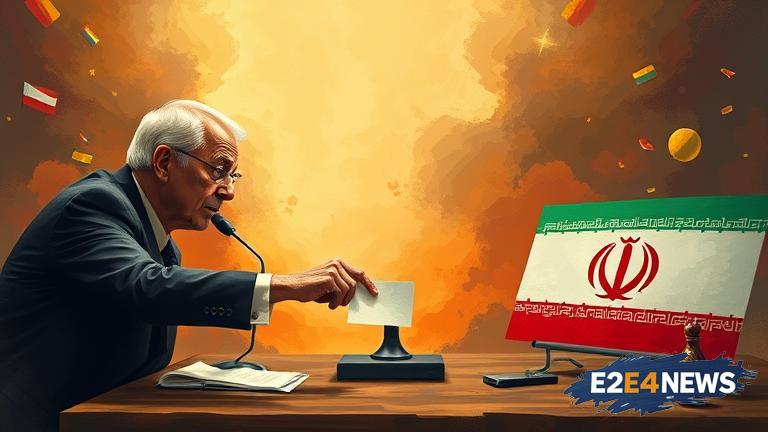The Joint Comprehensive Plan of Action (JCPOA), also known as the Iran nuclear deal, has been a cornerstone of international diplomacy since its inception in 2015. The deal, negotiated between Iran, the United States, the United Kingdom, France, Germany, China, and Russia, aimed to curb Iran’s nuclear program in exchange for relief from economic sanctions. However, the deal has been on shaky ground since the United States withdrew from it in 2018, reimposing sanctions on Iran and prompting the country to begin breaching the agreement’s limits on its nuclear activities. The snapback deadline, which allows for the reimposition of United Nations sanctions on Iran, has added an extra layer of complexity to the situation. As the deadline approaches, the international community is holding its breath, waiting to see how Iran will respond. The European Union, in particular, has been working tirelessly to salvage the deal, with the European Leadership Network (ELN) playing a key role in promoting dialogue and diplomacy. The ELN has emphasized the need for a narrow path forward, one that balances the concerns of all parties involved and avoids a complete collapse of the deal. This path would require Iran to return to compliance with the JCPOA, while also addressing the concerns of the international community regarding its nuclear program. At the same time, the United States would need to lift its sanctions on Iran, allowing the country to reap the economic benefits of the deal. The situation is further complicated by the fact that Iran has been steadily increasing its uranium enrichment levels, bringing it closer to the threshold for nuclear weapons production. The International Atomic Energy Agency (IAEA) has been monitoring Iran’s activities closely, and its reports have raised concerns about the country’s intentions. Despite these challenges, there are still reasons to be optimistic about the future of the JCPOA. The deal has been successful in preventing Iran from developing nuclear weapons, and it has also provided a framework for cooperation on non-proliferation and disarmament. Furthermore, the JCPOA has helped to reduce tensions between Iran and the international community, creating a space for dialogue and diplomacy. However, the window for salvaging the deal is rapidly closing, and it will require a concerted effort from all parties involved to find a way forward. The European Union, in particular, has a critical role to play in promoting a peaceful resolution to the crisis. The EU has been working closely with Iran and other parties to the deal to find a solution, and it has also been engaging with the United States to try to persuade it to rejoin the agreement. The situation is delicate, and the consequences of failure could be severe. A collapse of the JCPOA could lead to a nuclear arms race in the Middle East, with far-reaching consequences for regional and global security. It could also lead to a further escalation of tensions between Iran and the international community, potentially even resulting in military conflict. In order to avoid this scenario, it is essential that all parties involved work together to find a way forward. This will require a combination of diplomacy, dialogue, and compromise, as well as a willingness to address the concerns of all parties involved. The European Leadership Network has emphasized the need for a narrow path forward, one that balances the concerns of all parties and avoids a complete collapse of the deal. This path will require careful navigation, but it is the only way to ensure that the JCPOA survives and that the international community is able to prevent the proliferation of nuclear weapons. The stakes are high, and the clock is ticking. The international community must act quickly to find a solution, or risk facing the consequences of a nuclear arms race in the Middle East. The European Union, the United States, Iran, and other parties to the deal must work together to find a way forward, one that promotes peace, stability, and security in the region. The future of the JCPOA hangs in the balance, and it is up to the international community to ensure that it survives. The consequences of failure are too great to contemplate, and it is essential that all parties involved work together to find a peaceful resolution to the crisis. The European Leadership Network has called for a narrow path forward, one that balances the concerns of all parties and avoids a complete collapse of the deal. This path will require careful navigation, but it is the only way to ensure that the JCPOA survives and that the international community is able to prevent the proliferation of nuclear weapons. The situation is complex, and the challenges are significant. However, with careful diplomacy, dialogue, and compromise, it is possible to find a way forward. The international community must act quickly to address the crisis, and it must be willing to work together to find a solution. The future of the JCPOA is uncertain, but one thing is clear: the consequences of failure will be severe, and it is essential that all parties involved work together to find a peaceful resolution to the crisis.
